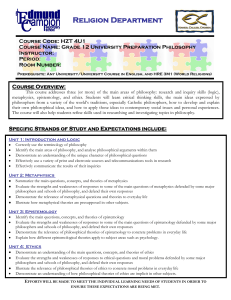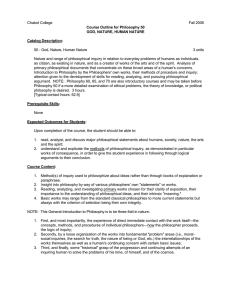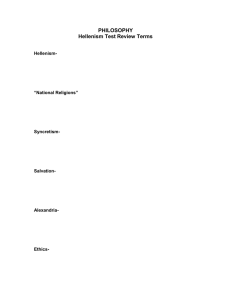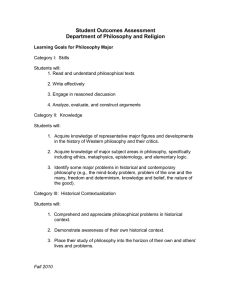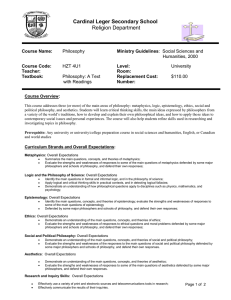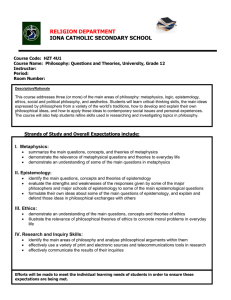Religious Studies Department St. Augustine Catholic Secondary School Course Code: HZT 4U1-
advertisement
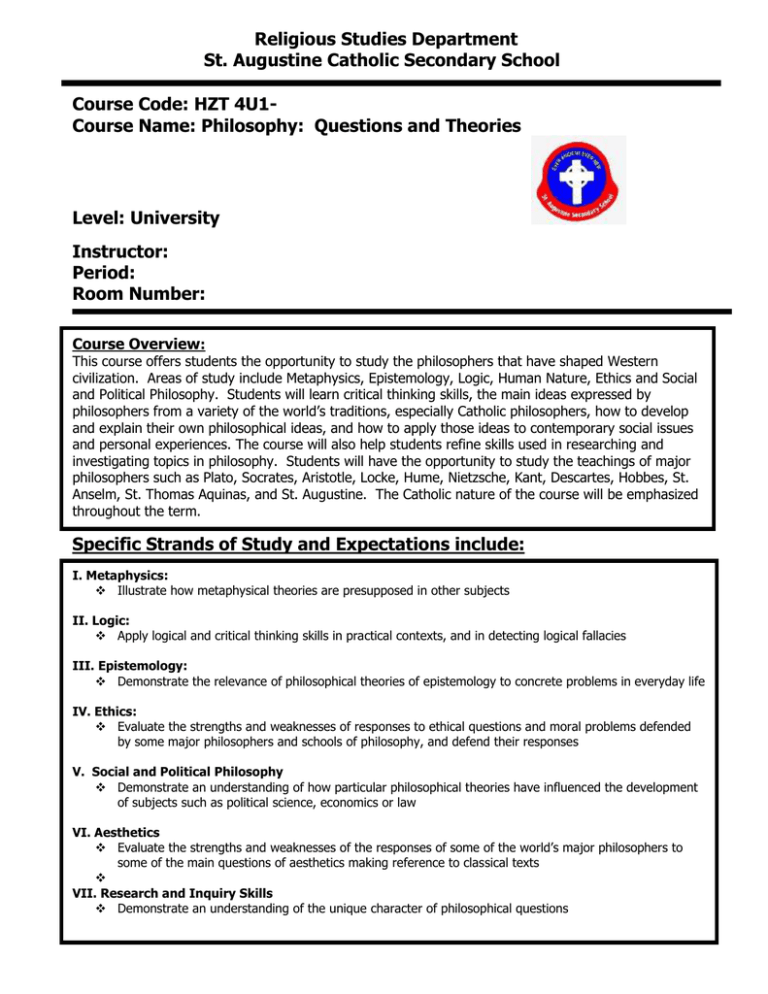
Religious Studies Department St. Augustine Catholic Secondary School Course Code: HZT 4U1Course Name: Philosophy: Questions and Theories Level: University Instructor: Period: Room Number: Course Overview: This course offers students the opportunity to study the philosophers that have shaped Western civilization. Areas of study include Metaphysics, Epistemology, Logic, Human Nature, Ethics and Social and Political Philosophy. Students will learn critical thinking skills, the main ideas expressed by philosophers from a variety of the world’s traditions, especially Catholic philosophers, how to develop and explain their own philosophical ideas, and how to apply those ideas to contemporary social issues and personal experiences. The course will also help students refine skills used in researching and investigating topics in philosophy. Students will have the opportunity to study the teachings of major philosophers such as Plato, Socrates, Aristotle, Locke, Hume, Nietzsche, Kant, Descartes, Hobbes, St. Anselm, St. Thomas Aquinas, and St. Augustine. The Catholic nature of the course will be emphasized throughout the term. Specific Strands of Study and Expectations include: I. Metaphysics: Illustrate how metaphysical theories are presupposed in other subjects II. Logic: Apply logical and critical thinking skills in practical contexts, and in detecting logical fallacies III. Epistemology: Demonstrate the relevance of philosophical theories of epistemology to concrete problems in everyday life IV. Ethics: Evaluate the strengths and weaknesses of responses to ethical questions and moral problems defended by some major philosophers and schools of philosophy, and defend their responses V. Social and Political Philosophy Demonstrate an understanding of how particular philosophical theories have influenced the development of subjects such as political science, economics or law VI. Aesthetics Evaluate the strengths and weaknesses of the responses of some of the world’s major philosophers to some of the main questions of aesthetics making reference to classical texts VII. Research andmade Inquiry Efforts will be toSkills meet the individual lea Demonstrate an understanding of the unique character of philosophical questions Course Breakdown Resources: The textbook, Philosophy: Questions and Theories, will be distributed to students during the first week of the course. The text and all other resources assigned to students are the responsibility of the student. Replacement cost for the text is $80.00. Unit 1: Metaphysics Unit 2: Logic Unit 3: Ethics Evaluation Structure:: Knowledge/Understanding Thinking/Inquiry Communication Application Unit 4: Epistemology Unit 5: Social Philosophy 25% 25% 25% 25% These are assessed in both term work and summative work as follows: TERM WORK - 70% SUMMATIVE WORK – 30% Culminating Task – 10% + Final Exam – 20% Evaluation Policy Students will be assessed & evaluated according to the work produced & skills displayed. Methods of providing feedback will include assessing work in process & evaluating completed assignments, tests, co-operative learning activities, simulations and presentations. Peer & self-evaluations will also be utilized. Student marks will be determined by evaluating process & product according to 4 categories & 4 levels. Level Category Knowledge/Understanding Knowledge of facts & terms Understanding of concepts & relationships Thinking/Inquiry Critical thinking skills Creative thinking skills Inquiry Skills Communication Communication of ideas and information Use of symbols & visuals Oral & written communication Level 1: 50-59% Level 2: 60-69% Level 3: 70-79% Level 4: 80-100% -Limited display of knowledge, skills and ability to apply concepts -Some success in displaying knowledge, skills and application of concepts -Considerable display of knowledge skills and ability to apply concepts -Thorough understanding of concepts and ability to communicate, think creatively and apply concepts Application Applications in familiar contexts Transfer of concepts to new contexts Making logical conclusions and predictions Use of technology / Making connections Feedback will also be provided for student learning skills. Skills like working independently, team work, organization, work habits and homework, and initiative are assessed independently student achievement and will be conducted through the use of a rubric indicating specific criteria to be achieved to receive each of the following letter grades: E –Excellent G – Good Other Evaluation Issues: S – Satisfactory N - Needs Improvement LATE ASSIGNMENTS: Late Work will be accepted for up to five school days (with a penalty of Up to 10%). However, late work will not be accepted if the teacher has already returned the corrected assignment to the class. STUDENT ABSENCES: Students are responsible for the completion of assignments, notes, reading and tests that were missed during any absence. Students with verified absences (proof of reason) must write missed tests or hand in assignments on the first day back following the absence. Unaccountable absences (ie. skips, truancy) will result in a mark of zero for missed evaluations. In the case of a prolonged excusable absence, the assessment date will be established at a mutually satisfactory time. The appropriate vice principal should be notified regarding extended absences. PLAGIARISM The submission of any ‘copied’ material, either in whole or in part, will result in the student receiving a grade of 0% on the affected assignment. This position applies to text, electronic information and peer created materials.
